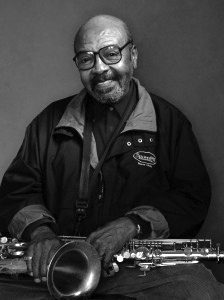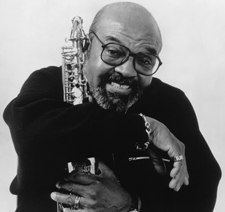James Moody
 James Moody was born in Savannah, Georgia on March 26, 1925. Growing up in New Jersey, he was attracted to the saxophone after hearing Don Byas and various saxophonists who played with Count Basie. He joined the US Army Air Corps in 1943 and played in the “negro band” on the segregated base. Following his discharge from the military in 1946 he played with Dizzy Gillespie for two years. Moody later played with Gillespie in 1964, where his colleagues in the Gillespie group, pianist Kenny Barron and guitarist Les Spann, would be musical collaborators in the coming decades.
James Moody was born in Savannah, Georgia on March 26, 1925. Growing up in New Jersey, he was attracted to the saxophone after hearing Don Byas and various saxophonists who played with Count Basie. He joined the US Army Air Corps in 1943 and played in the “negro band” on the segregated base. Following his discharge from the military in 1946 he played with Dizzy Gillespie for two years. Moody later played with Gillespie in 1964, where his colleagues in the Gillespie group, pianist Kenny Barron and guitarist Les Spann, would be musical collaborators in the coming decades.
In 1948 he recorded his first session for Blue Note Records, the first in a long recording career playing both saxophone and flute. That same year he relocated to Europe, where he stayed for three years, saying he had been “scarred by racism” in the U.S.His European work, including the first recording of “Moody’s Mood for Love” saw him add the alto saxophone to his repertoire and helped to establish him as recording artist in his own right, and were part of the growth of European jazz.
In 1952 he returned to the U.S. to a recording career with the premier jazz label Prestige Records and others, playing flute and saxophone. In the 1960s he rejoined Dizzy Gillespie. He later worked also with Mike Longo.
In a 1998 interview with Bob Bernotas, Moody stated that he believed jazz has definite spiritual resonance.
The James Moody Quartet (with pianist Renee Rosnes, bassist Todd Coolman, and drummer Adam Nussbaum) was Moody’s vehicle later is his career. Moody played regularly with Dizzy Gillespie Alumni All-Stars and the Dizzy Gillespie Alumni All-Stars Big Band and also often collaborated with former Gillespie alumnus, the trumpeter-composer-conductor Jon Faddis.
 Moody was an NEA Jazz Master and often participated in educational programming and outreach.
Moody was an NEA Jazz Master and often participated in educational programming and outreach.
On November 2, 2010, Moody’s wife announced on his behalf that he had pancreatic cancer, and had chosen not to have it treated aggressively. Moody died in San Diego, on December 9, 2010, of complications from pancreatic cancer.
To see more detailed information about Moody, please visit his official website, jamesmoody.com

